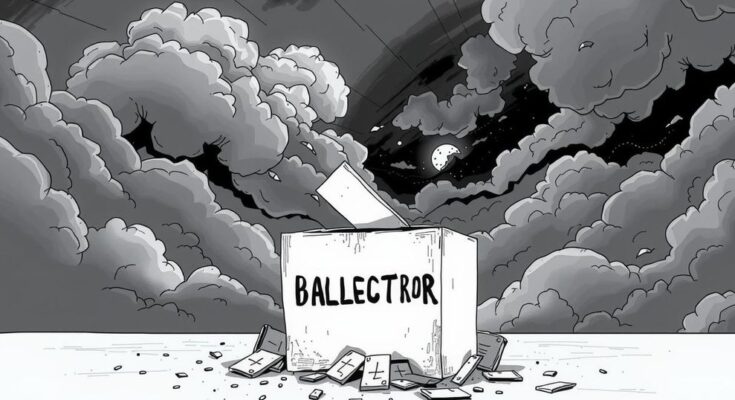Tanzania’s main opposition party, Chadema, has been banned from the upcoming elections after failing to sign a required code of conduct. The ban follows the arrest of leader Tundu Lissu on treason charges, which he claims are politically motivated. This situation strengthens the ruling CCM party’s chances of retaining power in the elections. Lissu has been vocal about the necessity for electoral reforms, stating that free and fair elections are impossible under the current conditions.
In a significant political development, Tanzania’s main opposition party, Chadema, has been officially barred from participating in the upcoming elections following the failure to sign a mandated code of conduct. Ramadhani Kailima, from the Independent National Elections Commission, announced that this disqualification arises from Chadema’s noncompliance with a procedural requirement. This comes shortly after Tundu Lissu, the party’s leader, was arrested and charged with treason amidst calls for electoral reforms at a recent rally.
The implications of this decision bolster the ruling party, Chama Cha Mapinduzi (CCM), which has remained in power for nearly six decades. Specifically, Kailima stated, “Any party that did not sign the code of conduct will not participate in the general election,” emphasizing that Chadema would also face a ban from by-elections until 2030. Earlier, Chadema had indicated it would not engage in signing the code, reflecting broader concerns regarding election integrity.
As Tanzania prepares for parliamentary and presidential elections, Lissu was anticipated to challenge the current president, Samia Suluhu Hassan. Hassan, who assumed office in 2021, initially received praise for reinstating some democratic norms following her predecessor’s authoritarian rule. However, opposition leaders accuse her government of intensifying repression against dissenters, a claim the government denies while investigating reported abductions.
Chadema’s platform centers around the slogan “No Reforms, No Election,” asserting that without substantial electoral reform, free and fair elections are unattainable. Lissu has demanded changes to the electoral commission, arguing it should not be composed of individuals directly appointed by Hassan. Authorities accuse him of attempting to incite rebellion while he has remained in custody, with his treason case adjourned until April 24, as his attorney claims the charges are politically motivated.
Lissu has a history of political adversity, having been arrested multiple times and surviving an assassination attempt in 2017. His return to Tanzania in 2023 followed promises of increased opposition freedoms by Hassan’s administration, although skepticism about the feasibility of true political reform remains prevalent.
The barring of Chadema from the upcoming elections underscores the contentious political landscape in Tanzania, characterized by escalating tensions between the ruling party and opposition forces. The developments surrounding Tundu Lissu’s arrest and the refusal to sign the electoral code highlight the challenges to democratic processes and reforms advocated by opposition parties. The implications of these actions may significantly influence Tanzania’s electoral integrity and political freedoms going forward.
Original Source: www.bbc.com




